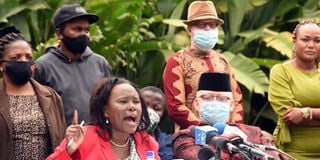CoE proposals make comeback

Member of Parliament representing Persons with Disabilities Dennitah Ghati (left) and Nominated Senator Isaac Mwaura address journalists at Serena Hotel in Nairobi on October 25. They raised concern with the BBI draft, saying that views presented by people living with disabilities in various counties were not properly captured.
What you need to know:
- Currently, Kenya has a presidential system which was sneaked in in Naivasha and shoved aside the parliamentary system that had been proposed by the Committee of Experts.
- The BBI proposal would like Kenyans to revert to a hybrid system of government, involving the President and the Prime Minister and where the cabinet ministers are part of Parliament.
After a 10-year experiment with a Constitution partly inspired by the US and South African systems and which emphasised a strict separation of powers, Kenyans will today walk back to the drawing board to kick-start another change.
At the Bomas of Kenya, the delegates, drawn from across the country’s 47 counties, will not only witness the official launch of the Building Bridges Initiative (BBI) report which was handed over to President Uhuru Kenyatta last Wednesday, but also start a process that will lead to a national referendum.
It now appears that some of the changes, initially rejected by MPs during the constitution-making process 10 years ago, could finally make a comeback.
Currently, Kenya has a presidential system which was sneaked in in Naivasha and shoved aside the parliamentary system that had been proposed by the Committee of Experts.
While the 2010 Constitution was adopted in the aftermath of the violence that engulfed parts of the country after the 2007 election, the current push for reforms is in a bid to address the ‘winner-takes-all’ arrangement, according to its key promoters — President Kenyatta and ODM chief Raila Odinga.
It also brings back proposals that had been recommended by the Committee of Experts in 2010 and which captured the spirit of the Bomas Draft, the Kilifi Draft and the Wako Draft. Most of these were thrown away in Naivasha when MPs met as an adhoc committee.
The BBI proposal would like Kenyans to revert to a hybrid system of government, involving the President and the Prime Minister and where the cabinet ministers are part of Parliament.
Harmonised Draft
The Ministers will be picked either from elected members or from outside but they will sit in the House to answer questions. The Harmonised Draft had created a hybrid system of government where power was flowing from an elected presidency to a Prime Minister elected by Parliament and two deputy prime ministers also elected by Parliament.
Another pick from the Harmonised Draft is where ministers are drawn from Parliament and professionals and where they continue to sit in the House. While this model was to help the president pick his Cabinet from political leaders and professional interests, it was knocked out in Naivasha. In the current arrangement, Cabinet Secretaries can only be summoned by House Committees to answer specific queries.
For the last 10 years, presidential candidates who lost elections were not only sidelined, but did not have any role to play in Parliament.
In the 2010 Constitution, Presidential candidates do not become members of Parliament and that denied them leadership role in the two Houses. The BBI proposal now suggests the aspirant who gets the second highest number of votes will become the Leader of Opposition, complete with a shadow cabinet, with a mandate to offer oversight to the Executive from within Parliament.
Presidential candidates
In the Harmonised Draft, it had been suggested that Presidential candidates could also vie for either Senate or National Assembly seats in order to play a leadership role in the House.
And as President Uhuru Kenyatta leads the country to officially launch the BBI report, there is every likelihood the country is staring at a greater possibility of adopting the very proposals that were spectacularly rejected by the PSC in Naivasha
Other changes the task force has proposed include doing away with the vetting of Cabinet Ministers and Principal Secretaries.
Before his abrupt death on Saturday, Mr Nzamba Kitonga, who chaired CoE, had told the Nation that the recommendations by the task force have vindicated his team’s proposals and that MPs were wrong in instituting the kind of changes they did in Naivasha during the validation process.
“It is the mistakes the MPs committed in Naivasha which have come to haunt Kenya. The harmonised draft contained all the provisions of the expanded Executive captured in BBI. These provisions were intended to create national cohesion and harmony,” Mr Kitonga had said.
Yesterday, University of Nairobi don Herman Manyora said the proposals have made a comeback to address the winner-takes-it-all concept.





